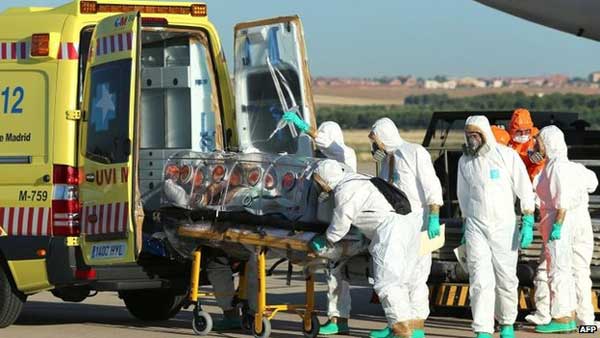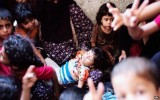Liberia to receive Zmapp drug to treat Ebola virus
Liberia will receive an untested experimental drug, Zmapp, to treat people infected with Ebola, the Liberian government says.

A Spanish priest who was infected with Ebola in
The move came after a request to the
The news came as medical ethics specialists met in
The World Health Organization, which is hosting the meeting, says some 1,013 have died from Ebola in
US government officials said their role had been to put Liberian officials in contact with Zmapp maker Mapp Biopharmaceutical.
'No cost'
The pharmaceutical company said its supply of the drug was exhausted after its supplies were sent to
The drug was "provided at no cost in all cases," the company added.
Zmapp has been used in the
However, the drug has only been tested on monkeys and has not yet been evaluated for safety in humans.
The World Health Organization (WHO) will announce the outcome of its emergency meeting on the role of experimental drugs on Tuesday.
No rock and hard place
Earlier,
It is the second country, after
There is no cure for Ebola, which has infected at least 1,779 people since the outbreak was first reported in
The Liberian government was aware of the risks associated with Zmapp, but the alternative was to allow many more people to die, Information Minister Lewis Brown told the BBC on Monday.
"The alternative for not testing this is death, a certain death," he said,
"This is not even the rock and the hard place for us," he said, referring to the country's health services, which he says are overburdened with patients carrying the disease.
The situation has prompted poorly equipped health workers to abandon work and institutions to close to the public.
Ebola's initial flu-like symptoms can lead to external haemorrhaging from areas like eyes and gums, and internal bleeding which can lead to organ failure. Patients have a better chance of survival if they receive early treatment.
BBC
- Thailand welcomes over 10 mln foreign arrivals so far this year (19/04)
- Indonesia’s Ruang volcano erupts, hundreds evacuated (18/04)
- Japan’s 2024 Diplomatic Bluebook sketches out cooperation orientation with ASEAN (18/04)
- Philippines seizes 1.8 tonnes of meth in record drug bust (17/04)
- Thailand looks towards cashless society (15/04)
- The strategic alliance relationship (13/04)
- Singapore keeps monetary policy unchanged (13/04)
- Lao economy forecast to grow 4% in 2024, 2025: ADB (12/04)
 Thailand welcomes over 10 mln foreign arrivals so far this year
Thailand welcomes over 10 mln foreign arrivals so far this year
 Indonesia’s Ruang volcano erupts, hundreds evacuated
Indonesia’s Ruang volcano erupts, hundreds evacuated
 Thailand looks towards cashless society
Thailand looks towards cashless society
 Singapore keeps monetary policy unchanged
Singapore keeps monetary policy unchanged
 The strategic alliance relationship
The strategic alliance relationship
 Lao economy forecast to grow 4% in 2024, 2025: ADB
Lao economy forecast to grow 4% in 2024, 2025: ADB
 IMO Secretary General: Attacks in Red Sea pose serious threats to global maritime security and trade
IMO Secretary General: Attacks in Red Sea pose serious threats to global maritime security and trade
 Vietnam condemns attack on Iranian embassy in Syria
Vietnam condemns attack on Iranian embassy in Syria
 Indonesia strives to control domestic rice prices
Indonesia strives to control domestic rice prices
 Phnom Penh authorities ensure social order for Chol Chnam Thmey
Phnom Penh authorities ensure social order for Chol Chnam Thmey



